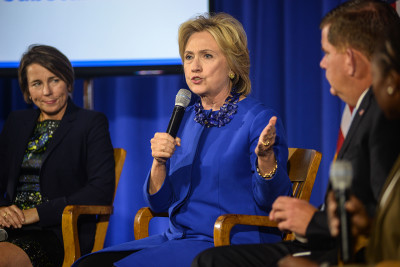
As the 2016 presidential election draws closer, Massachusetts leaders are endorsing candidates and participating in campaign efforts.
Massachusetts Sen. Ed Markey and Massachusetts Senate President Stanley Rosenberg endorsed former U.S. Secretary of State Hillary Rodham Clinton on Oct 14. and Oct. 5, respectively. Boston City Councilor Matt O’Malley spoke in support of former Maryland Gov. Martin O’Malley at the Massachusetts Democratic Party Convention on Sep. 19. Massachusetts Attorney General Maura Healey endorsed Clinton in August and has accompanied her to several events in New Hampshire.
Massachusetts Gov. Charlie Baker, Boston Mayor Martin Walsh and U.S. Sen. Elizabeth Warren have yet to make endorsements. Baker is a Republican while Walsh and Warren are Democrats.
John Berg, professor of government at Suffolk University, said the combination of endorsements with ongoing support is crucial to developing a strong campaign.
“The importance is letting people know if they like you. [What is] more important is once a political figure endorses a presidential candidate, it usually means that they’re going to get involved in the campaign … it is important for building up an organization, otherwise it is very hard to build up from scratch,” Berg said.
Berg also said that local politicians might endorse campaigns in hopes of breaking into a larger political environment.
“If you’re an elected official, you have your own campaign every few years, and this gives you a way to keep in practice, to keep your campaigns used to volunteering,” Berg said. “[And] there’s always the possibility that if you’re in there early with an endorsement and work hard, maybe you’ll be brought to Washington in some capacity, and some people find that rewarding.”
Walsh may not make an endorsement yet, Berg said, because his campaign organization is concentrating on the Boston City Council election.
Nicholas Beauchamp, a professor of political science at Northeastern University, said the increasing number of “outsider” candidates could pose a problem for opposing parties.
“Some folks are arguing that the rise of the outsider candidates in the Republican primary [such as Donald Trump, Ben Carson and Carly Fiorina] suggests that endorsements and the party have lost some of their control over the process, or that endorsements are now a trailing rather than leading indicator,” he wrote in an email. “But in my view that will really depend on whether one of these outsiders ever actually wins it.”
Among the Democratic candidates, Clinton has the most endorsements from U.S. representatives, senators and governors, according to FiveThirtyEight.
Approximately 56 percent of leaned Democrats support Clinton, 22 percent support Vermont Sen. Bernie Sanders and 1 percent support O’Malley, according to a poll by the Washington Post and ABC News from Oct. 15-18.
Several residents said endorsements influence support for both local and national officials.
Caroline Chobanian, 23, of Brighton, said endorsements from local government officials do not affect her opinions or polling decisions.
“I would say that people who are in local power don’t have much sway on me,” she said. “I’m not that involved in local politics, nor am I exposed to their opinions as much. I pay more attention to things coming directly from the source.”
Sherri Michaud, 32, of Allston, said while leaders will endorse those who hold similar views to them, voters should still do research on the candidates.
“Reading about the issues that are going on and [leaders’] stance on these issues and keeping up with campaign speeches and what they are saying would influence me the most. And talking to people,” she said. “It’s one opinion, and one person. And just because this person holds a specific office doesn’t mean that opinion holds more value than your own opinion. Do your research.”
Michaud said she does not particularly see an upside to endorsements, but added that they could potentially swing voters.
“Because they [leaders] are in a position of power, it may influence the way other people feel and possibly might influence opinion kind of unethically,” she said. “I know certain politicians don’t tell the truth about certain things, [and] that bothers me.”
Stephanie Morin, 22, of Brighton, said it is difficult to say whether political endorsements are helpful to the public or not.
“I guess there are pros and cons. For senators of Massachusetts to come out and represent presidential candidates can be a great thing in some ways, so that way you know what their stances are on some things and issues that are going on,” she said. “But, at the same time it may compromise how the residents of Boston may feel about them endorsing some presidential candidates.”
Monika Nayak contributed to the reporting of this article.






















































































































